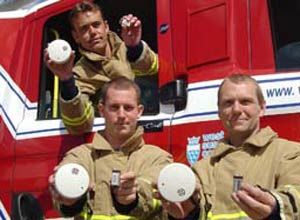FireRescue1’s Year in Review 2008
 Photo West Sussex, UK, Fire Service We have to become more involved with our communities. |
Another year is coming to an end. There is a tendency to sit back and reflect, to consider how the events of this year fit into the greater contexts of our lives as individuals, small groups and a larger society. For the firefighter, perhaps the greatest news of impact this year is that we as individuals, small groups and a larger society are flat broke.
Money is the root of evil but it is also the source of diesel fuel for fire engines. It is true that most, if not all, municipal and state governments are in a state of fiscal crisis. It is also true then that firefighting positions will be lost and fire stations will be closed. The song and dance has already begun between city/municipal leaders and the unions. One side claims that the cuts are necessary; the other side claims that people will die if the cuts are made. Both are telling the truth.
Grab the morning paper, read it, and it becomes obvious that the cuts are needed. We have to keep giving more until the people we claim to serve are stabilized. We cannot take pay raises and buy new fire trucks while our citizens stand in long lines waiting for food and rent assistance. That makes no sense. We have to take furloughs and close some stations. It is important, I think, that the public know we are suffering with them. They will remember that when times are better. I think it is more important to preserve jobs so that the new guy we call “rookie” does not get laid off. If the fire service is the family it claims to be, then we share our bread and don’t ask for a larger portion while the rest of the family and society suffer.
Flawed logic
When we start shutting fire stations it is true that people might die, but that chance of death exists independent of fire engines. The logic that says if fire station X is closed some one will die is tragically flawed as it assumes that the only variable in people living or dying is the presence of a fire engine. The fire service does more EMS than anything, and it makes senses that if you start closing EMS service then more people might die than might have otherwise, but there is no way to prove that. What we can prove, however, is that working smoke detectors, good escape plans and sprinkler systems all cost less than a fleet of fire engines and all of those things save lives.
By the way, staffing cuts do not kill firefighters. Fire officers and chiefs who fail to acknowledge that staffing shortages call for a change in tactical approach kill firefighters. The number AND experience of firefighters on the scene of an incident drive how we attack that incident. It is true that a two-person ladder truck is less effective than a five-person ladder truck.
But when you only have two people you cannot behave like you have five. Vacant properties have to be finally treated like vacant properties. We finally have to realize that it might make more sense to leave the fire apartment door closed while we search the adjacent apartments.
We can do with less but we will simply have to get smarter. Response times are not the only valid metric for the service we provide. The picture is bigger and more complex than that.
In order to avoid extinction, we must change. In order to remain relevant, we must change. We have to become more involved with our communities, we have to be out there helping at the food bank, delivering food to the home bound, installing smoke detectors with a smile, talking at the schools. We have to spend less, go green where we can, and constantly look for ways to redefine the service we provide. We have to start thinking more.
The fire service grew out of an abiding desire to sacrifice personal safety and gain for the greater societal good. We must continue to find ways to re-connect with that mindset, to remain connected to our communities. If we fail in this regard, society will fail to recognize the need for big shiny fire trucks and opt instead for store-bought escape ladders, smoke detectors, sprinkler systems and good insurance.












